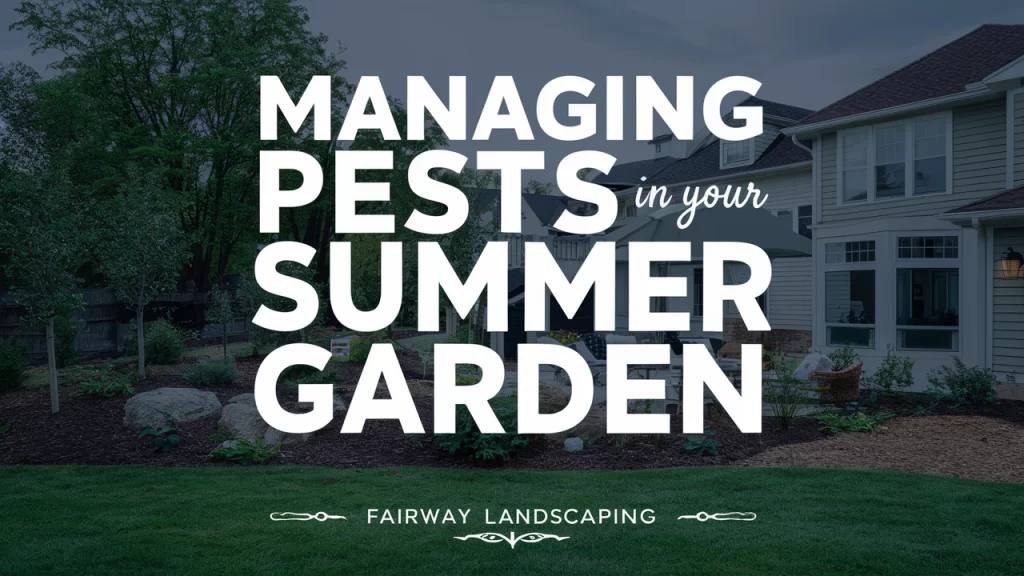Picture this: you’ve spent countless hours nurturing your summer garden, only to find your prized tomatoes riddled with holes and your rose bushes swarming with aphids. Pest infestations can be frustrating and disheartening for any gardener. However, with the right knowledge and techniques, you can effectively manage pests and maintain a healthy, thriving garden. This article will explore natural and effective pest management strategies to help you keep your summer garden in top shape.

Identifying Common Garden Pests
Recognizing the Usual Suspects
The first step in managing garden pests is to identify the culprits. Some of the most common pests you might encounter in your summer garden include:
- Aphids: Small, soft-bodied insects that feed on plant sap, causing distorted growth and sticky honeydew secretions.
- Japanese Beetles: Metallic green beetles that skeletonize leaves and feed on flower petals, leaving behind damaged foliage.
- Slugs: Slimy, shell-less mollusks that leave irregular holes in leaves and can devour seedlings overnight.
Familiarize yourself with the appearance and signs of infestation for each pest to catch problems early. For more information on identifying garden pests, check out our previous blog post: Know Your Garden Pests: A Visual Guide.
Natural Pest Control Methods
Organic Solutions for Garden Pests
When it comes to managing pests, opt for eco-friendly, natural solutions that minimize harm to beneficial insects and the environment. Some effective organic pest control methods include:
- Neem oil: A vegetable oil derived from the neem tree that disrupts the life cycle of many common garden pests.
- Diatomaceous earth: A fine powder made from fossilized algae that physically damages the exoskeletons of soft-bodied pests.
- Beneficial insects: Predatory insects like ladybugs, lacewings, and parasitic wasps that feed on garden pests, keeping their populations in check.
To learn more about our organic garden care services, visit our Organic Garden Care page.
Companion Planting for Pest Management
Using Companion Plants to Deter Pests
Companion planting involves strategically placing certain plants together to benefit each other, including pest control. Some examples of companion planting for pest management include:
- Marigolds: These bright flowers release compounds that repel nematodes, making them excellent companions for tomatoes and other susceptible crops.
- Basil: The strong scent of basil can deter flies and mosquitoes, making it a great companion for outdoor seating areas and vegetable gardens.
- Nasturtiums: These vibrant flowers act as a trap crop, attracting aphids away from your main crops, making them easier to manage.
For more companion planting strategies, read our blog post: Companion Planting 101: Pairing Plants for a Healthier Garden.
Creating Habitats for Beneficial Insects
Encouraging Natural Predators in Your Garden
Beneficial insects are your allies in the fight against garden pests. By creating habitats that attract and support these natural predators, you can maintain a balanced ecosystem in your garden. Some key beneficial insects include:
- Ladybugs: These beloved beetles feed on aphids, mealybugs, and other soft-bodied pests.
- Lacewings: Both the larvae and adult stages of lacewings are voracious predators of aphids, mites, and other small insects.
- Parasitic wasps: These tiny wasps lay their eggs inside the bodies of garden pests, effectively controlling their populations.
To attract beneficial insects, plant a variety of flowering plants, provide water sources, and avoid using broad-spectrum pesticides. Learn more about our Wildlife-Friendly Garden Services.
Preventative Measures for Pest Control
Preventing Pest Problems Before They Start
Prevention is key when it comes to managing garden pests. By implementing preventative measures, you can minimize the risk of pest infestations and reduce the need for intervention. Some essential preventative strategies include:
- Regular garden inspections: Routinely check your plants for signs of pests or damage, catching problems early before they escalate.
- Proper plant spacing: Ensure adequate air circulation and sunlight penetration by spacing plants appropriately, minimizing the risk of pest and disease issues.
- Crop rotation: Avoid planting the same crops in the same location year after year to break pest and disease cycles.
For more garden maintenance best practices, read our previous blog post: 5 Essential Garden Maintenance Tips for a Thriving Landscape.
Managing pests in your summer garden is an ongoing process that requires a combination of identification, natural control methods, companion planting, beneficial insect habitats, and preventative measures. By implementing these strategies, you can minimize pest damage and maintain a healthy, vibrant garden throughout the growing season.
If you’re looking for professional assistance with pest management or any other landscaping needs, contact Fairway Landscaping today at (443) 206-0221 or visit our contact page to schedule a consultation.
